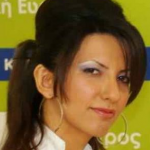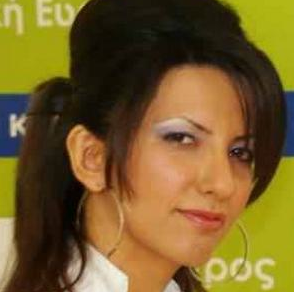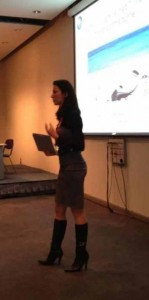
Jazzing Up Project Work With Technology
Dina Dobrou
“Tell me and I will forget
Show me and I may remember,
Involve me and I will learn”
(Attributed to Confucius)
“I never teach my students.
I only attempt to provide the conditions in which they can learn”
(Attributed to Albert Einstein)
The key concepts deriving from these two quotes regarding education are ‘involvement’ and ‘autonomy’ and Project Based Learning (PBL) can provide these in more ways than one.
Over the years I have worked on projects in my classes, sometimes reluctantly, as I only had 3-4 hours of contact per week with my students, on average. I felt that working on projects was a luxury I couldn’t afford but all that changed four years ago when I started working in summer school with multicultural students.
In summer school project work is an integral part of the curriculum, as is emphasis on oral communication. However, I soon realized (since I could spend more time per week with my students) that there is a profound difference between PBL and simply designing a poster, for instance, as part of the so-called ‘project work’ hour.
The whole point of PBL is to put learners into ‘make believe’ situations and let them explore, and in so doing ‘provide them with the conditions in which they can learn’ autonomously, as Einstein suggested. Projects can revolve around a theme and can run over a period of time, a whole term even, which allows learners to collaborate and interact, picking up useful academic and life skills along the way such as negotiating and presenting, to name but a few.
One of the challenges I’ve had to consider was keeping a balance between the learners’ contact with ‘the 3D world’ and the use of technology (firstly because I am a proponent of educational technologies and secondly because learners themselves can be highly ‘techy’ and often resort to their smartphones when looking for information or inspiration or out of sheer addiction AKA ‘the smartphone trance’). Having said that, I have had learners in the past who protested when I suggested opting for a digital poster as opposed to a paper one and that has taught me a lot about the significance of that balance.
An opportunity to combine the two soon presented itself: June 2013, London. Summer school at Brunel University begins. We have the usual mix of YLs, Teens and Young Adults (rare but still there). All classes are a great mix of nationalities. Students make new friends from other cultures and practice the language both in class and during activities such as sports, casino nights, disco nights even! A closed group of 10 teenage Turkish girls however, is not allowed to take part in any activities other than afternoon excursions and some sports because their parents have specifically requested they have intensive lessons (on top of the 3 hour lessons a day they were having already)!
Imagine everyone out having fun and playing games while they had to be in class! Morning classes were not an issue because they were among different people, but during afternoon classes they were very uncooperative and negative. Indeed when I first met them at the end of week 1, they were lethargic and disinterested. What I noticed, though, on that first meeting was that they were all really into fashion, dressed in designer clothes head to toe and all of them had smartphones!
So, I suggested the option of project work to their Group Leader – project work that would somehow be fun but also able to provide proof of progress so that the parents would remain satisfied. And a fashion magazine project was born! But this was a project by the end of which you would be able to see the students’ progress as they had been working on it.
As soon as we entered the class, learners were presented with fashion magazines they could flip through in order to get ideas of what might go into such a magazine and then ideas were brainstormed about what should be included. A company was set up, the various jobs/positions were defined and discussed and roles were delegated accordingly (we had 10 students, so 10 Directors in our magazine).
Over the next two weeks, the Directors worked in groups in different working stations, collaborating and building up the magazine. Selecting images, writing up interviews, creating podcasts and videos, summarizing articles found in paper magazines, preparing for presentations, running meetings to discuss what had been covered and what we should be focusing on the following day as well as who should collaborate with whom was all in a day’s work.
All of the videos and podcasts created were turned into QR codes which were printed out, cut out and placed on the pages of the magazine. Since we relied quite a lot on technology for the curation/creation of the magazine, Internet safety was also discussed and I was pleased to see that the learners had picked up some digital literacy skills along the way.
When the magazine was finalized, the Directors prepared a poster to advertise a networking event, during which their work would formally be presented to the summer school’s Centre Management Team and their Group Leader. They had to collaborate for the event as well in order to decide how to organize it, where to host it and how to set up the room as well as what to offer guests, which meant a field trip to the supermarket to buy food and drinks. Once each of the Directors had presented their work, the visitors were invited to walk around, scan the QR codes and explore the contents of the magazine.
The feedback from ‘the audience’ was nothing less than extremely positive, the look of pure accomplishment and self-confidence in the learners’ faces is something I will never forget and the experience of running such a project is something I hope will act as my guide for future ones.
And since a picture is worth a thousand words please watch this …
http://animoto.com/play/cvXzBDi3UnWd8ZRaNJnzUw
Connect with authors, iTDi Associates, Mentors, and Faculty by joining iTDi Community. Sign Up For A Free iTDi Account to create your profile and get immediate access to our social forums and trial lessons from our English For Teachers and Teacher Development courses.


